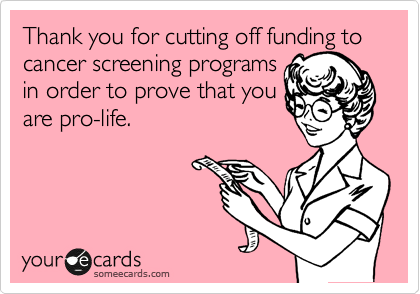This weekend I signed my family up for the local ‘Race for the Cure’, I’ll be running the 5k and my wife and boys will be walking it. I covered the firestorm related to the Komen Foundation suddenly pulling funding for Planned Parenthood efforts in Cancer screening and health care for needy women a few months ago, so I was obviously aware of THAT dimension … but we decided to participate despite of the political mischief of the Komen leadership. Nevertheless, it definitely played into our willingness to fund-raise for the event (and my reluctance to spread links for the event).
Apparently many are taking further steps and simply not participating, according to an article in USA Today:
Fewer sign up to race for the cure, Fundraising also down after Planned Parenthood flap
By Lindsay Powers USA TODAY
A little more than a week before the Central Indiana Susan G. Komen for the Cure race on April 21 in Indianapolis, about 23,000 people had signed up — 30% fewer than at the same time before last year’s race.About 26,000 registrants are expected by race day. Nearly 37,500 people participated in the race last year, according to Dana Curish, executive director of the Central Indiana Komen affiliate. Curish said fundraising was also down 30% from the same pre-race time last year.
The Indianapolis race is among a growing number of Komen for the Cure events that have seen or are seeing a drop in registrants and fundraising this year, in the wake of the breast cancer-fighting organization’s announcement in January of its controversial decision — quickly reversed — to suspend funding to sexual and reproductive health care provider Planned Parenthood while it was under congressional investigation.
“The issues (relating to Planned Parenthood) have certainly had an impact (on some races), there’s no getting around that,” said Leslie Aun, a national spokeswoman for Komen, though she said economic pressures have also played a part.
Southern Arizona’s race race drew 7,200 participants March 25 compared with 10,000 last year and there was a roughly 30% decline in fundraising, said Gillian Drummond, a spokeswoman for the affiliate. Though there was still much support and other factors involved, she said the affiliate thinks the decline was largely a result of Komen’s decisions this year. “We had a community that was glued together. . . . Suddenly overnight, politics divided them,” Drummond said.
The Southwest Florida Race for the Cure on March 10 brought in about $850,000 this year, Executive Director Miriam Ross said, down roughly 15% from last year’s total of more than $1 million, she said. Registration, she said, was also down about 15%.Ross said there are many factors that went into the decrease in donations, not the least of which is the economy. The problem is, she said, the poor economy means more people are out of work and without health insurance, so more people need free breast cancer services.
Breast cancer survivor Brenda Allen-Hicks, 66, was disappointed by the Planned Parenthood situation, but she said she thought the cause was too great not to participate in the Indianapolis race, which will be her eighth. “The Planned Parenthood (situation) gave the Komen foundation a black eye, but it certainly hasn’t destroyed it,” Allen-Hicks said. “It surprises me that participation is down because the need is still there, and it’s very great.”
Naomi Levine, chair and executive director of New York University’s George H. Heyman Jr. Center for Philanthropy and Fundraising, said the Komen incident shows it is “not a good idea” for an organization such as Komen to get involved in political issues.
To move on, she says, “they must project the positive things the organization is doing.”
What Levine said is exactly what I stated before: health charities need to avoid get political. And whether or not the Komen move was IN FACT political, it certainly looked that way … and the impact is being felt. Many are torn – we love supporting charities that benefit cancer research, but we won’t dump money into an anti-woman war-chest.
Have you seen or heard about any decrease in participation or funding in your area?
